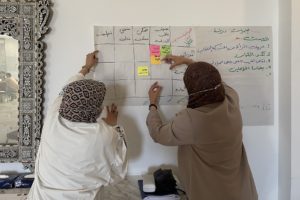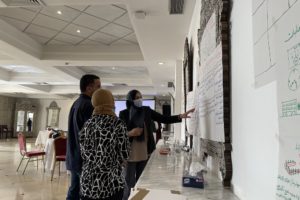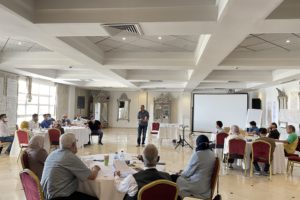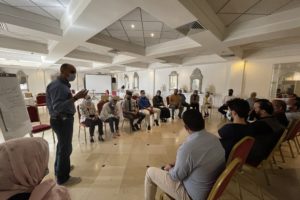Libya: the value added of local peace and reconciliation processes
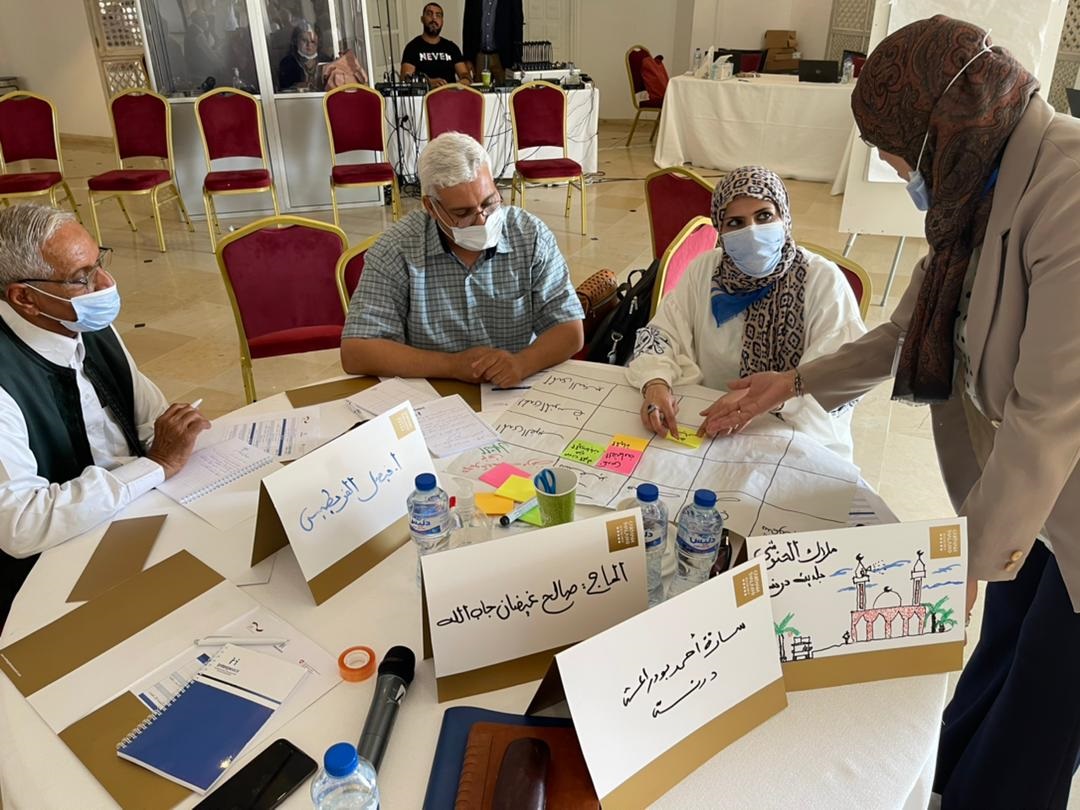
Libya goes through challenging months as the country heads towards elections on 24 December. On 2 July 2021, the Libyan Political Dialogue Forum (LPDF), supported by the UN, was not able to reach a consensus on the constitutional basis of the upcoming elections. Earlier in June, during the Second Berlin Conference, there was no significant progress in terms of withdrawal of foreign troops or mercenaries from the country.
In this highly divided context, community-based reconciliation processes are critical to address conflicts stemming from local grievances. However, too often, local populations and communities are not sufficiently involved in the higher-level peace processes. To bridge this gap, Interpeace has gathered a broad range of change agents involved in establishing a common vision of priorities for peace to bring solutions at the local level through community dialogue.
The deep political divisions that characterize Libya both stem from and feed into local grievances – creating a vicious cycle and making the work at the community level all that more important. Since 2011, Interpeace’s engagement in Libya has focused on the development of local infrastructure for peace and social cohesion. Amid this prolonged state of conflict, Libyans are frustrated with the continued political stagnation, failed dialogue processes, and unkept promises. In the context of long-standing multifaceted crisis in Libya, there are high hopes for a democratic transition in the coming months, even with the last setbacks, but that is complicated by numerous social and political challenges in addition to the ongoing conflict and the spread of Covid-19.
The years of conflict have also weakened the already fragile social cohesion and widened the gaps in the country. Re-establishing social cohesion and inclusion must be a priority while building sustainable peace in such a complex conflict situation as the one in Libya. Through its project “Strengthening Local Cohesion in Libya: A Pathway to Lasting Peace”, Interpeace seeks to reinforce local resilience capacities for sustainable peace and contribute to the development of local environment for stability and future growth in Libya. Almost 30 communities benefit from the programme.
- Credits: Interpeace
Over the last ten years in Libya, Interpeace has developed and accompanied a network of over 200 ‘Change Agents’ or ‘Dialogue Facilitators’, across the country working directly with the population. This group is made up of influential individuals of all ages, genders and social status. Its members play an important role in building resilient peace in Libya from the bottom-up, by ensuring that engaged communities are equipped to be more resilient to conflict, especially at the community level. This initiative is aimed at catalyzing collaboration between Libyan communities, and with national authorities, to establish a common vision of priorities for peace through strengthening dialogue platforms and building the capacity of change agents in local communities. This effort is supported by the German Federal Foreign Office and the Swiss Federal Department for Foreign Affairs.
“On the practical level, I was greatly empowered in my social participation. There were some activities I stayed away from, thinking they belong to the specialists, and I never participated. I felt that it [the engagement in the initiative] gave me the courage to participate. I was staying away from those having opposing ideas and positions, but I began to intervene in positive ways. If a tough situation occurs, I try and find constructive solutions to it,” says a female change agent from Tobruk.
In the programme’s framework, Interpeace sets up various initiatives to bring together change agents based in different parts of Libya and support their efforts in building peaceful social environment. The most recent gathering took place in Tunis from 20 to 28 June 2021. It was organized to help these community leaders and influencers in identifying and addressing priority issues inside communities.
“This experience can be characterized in two ways: we established relationships in all Libyan cities when maintaining direct communication. I mean, now I have friends in every Libyan city, and I can say that 60% of the advantage I gained is the fact that I personally know young people from all the cities and from different fields. […] Personally, I have met influential people in different communities, wise people and influencers in civil society. […] We know mistrust that can exist among individuals towards international organisations working in Libya, but Interpeace has a different approach – this is a special experience,” explains a male change agent from Tobruk.
- Credits: Interpeace
Forty change agents divided into two groups participated in four-days sessions for each. The workshop aimed at providing the dialogue facilitators who are based in the eastern part of Libya with the required skills and tools to design and conduct community dialogue tailored to their local context.
“I am shy – even when I have something to say, I prefer to stay in the background, keep quiet. I am not social by nature, I prefer staying at home. My participation in the workshops […] made me want to express my point of view whether or not it is accepted by the other party. Now, on the social level I have the power to participate in ongoing projects in Libya, such as enhancing the role of women in electoral processes, as voters or as candidates, as well as at the level of national reconciliation,” says a female change agent from Al-Baida.
This work is critical with the current changes taking place in the sensitive political context of Libya and ahead of elections in which communities will play a key role.
“The role of the change agents will be critical in the eventual implementation of a political agreement in bringing public support, particularly among civil society, who are likely to be key champions of any peace outcomes negotiated. The sustainability of a political solution will be dependent on a shared societal agreement about what peace means and what it entails, but also community engagement –going beyond simple outreach - as an actual process of inclusion in the implementation to ensure sustainable peace,” concluded Renée Larivière, Senior Director for Programme Management at Interpeace.
